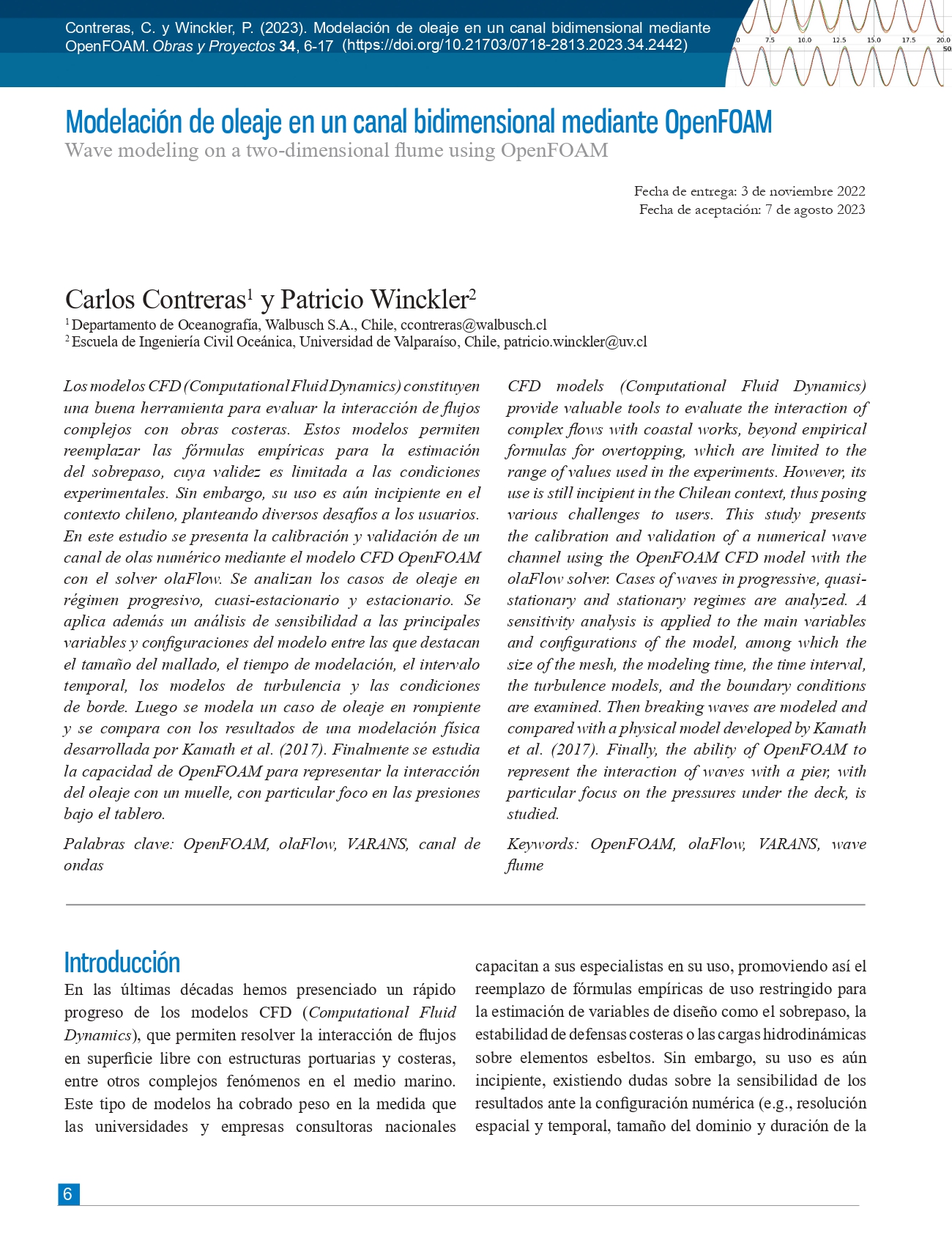Wave modeling on a two-dimensional flume using OpenFOAM
DOI:
https://doi.org/10.21703/0718-2813.2023.34.2442Keywords:
OpenFOAM, olaFlow, VARANS, wave flumeAbstract
CFD models (Computational Fluid Dynamics) provide valuable tools to evaluate the interaction of complex flows with coastal works, beyond empirical formulas for overtopping, which are limited to the range of values used in the experiments. However, its use is still incipient in the Chilean context, thus posing
various challenges to users.
This study presents the calibration and validation of a numerical wave channel using the OpenFOAM CFD model with the olaFlow solver. Cases of waves in progressive, quasistationary and stationary regimes are analyzed.
References
Arjona, S. (2016). Análisis funcional de un disipador de oleaje pasivo basado en medios porosos. Tesis de magister, Universidad de Cantabria, España
Borges, P.M (2013). Free-surface flow interface and airentrainment modelling using OpenFOAM. Doctoral thesis, Universidad de Coimbra, Portugal
Campos-Caba, R. y Winckler, P. (2023). Evaluación de caudal de sobrepaso en una defensa costera mediante un modelo basado en las ecuaciones de Navier-Stokes promediadas por Reynolds en el volumen (VARANS). Obras y Proyectos 33, 6-14
Contreras, C. (2020). Calibración y validación de OpenFOAM para la modelación de un canal de ondas en 2D. Memoria de título de Ingeniero Civil Oceánico, Universidad de Valparaíso,Chile
Dean, R.G. and Dalrymple, R.A. (1991). Water wave mechanics for engineers and scientists. Vol. 2. World Scientific, Singapore
Dingemans, M.W. (1994). Water wave propagation over uneven bottoms. Advanced Series on Ocean Engineering 13, World Scientific, Singapore
Greenshields, C.J. (2017). User guide for openFOAM. OpenFOAM Foundation Ltd., England
Higuera, P. (2017). olaflow: CFD for waves. https://doi.org/10.5281/zenodo.1297013
Higuera, P. (2015). Aplicación de la dinámica de fluidos computacional a la acción del oleaje sobre estructuras. Tesis doctoral, Universidad de Cantabria, España
Higuera, P., Losada, I. J. and Lara, J. L. (2015). Three-dimensional numerical wave generation with moving boundaries. Coastal Engineering 101, 35–47
Holthuijsen, L.H. (2007). Waves in oceanic and coastal waters. Cambridge University Press, UK
Jasak, H., Weller, H.G. and Nordin, N. (2004). In-cylinder CFD simulation using a C++ object-oriented toolkit. SAE World Congress & Exhibition, USA
Kamath, A., Alagan Chella, M., Bihs, H. and Arntsen, Ø.A. (2017). Energy transfer due to shoaling and decomposition of breaking and non-breaking waves over a submerged bar. Engineering Applications of Computational Fluid Mechanics 11(1), 450-466
Kisacik, D., Troch, P. and van Bogaert, P. (2012). Description of loading conditions due to violent wave impacts on a vertical structure with an overhanging horizontal cantilever slab. Coastal Engineering 60, 201-226
Lambert, R.J. (2012). Development of a numerical wave tank using OpenFOAM. MSc thesis, Universidad de Coimbra, Portugal
Larsen, B.E., Fuhrman, D.R. and Roenby, J. (2019). Performance of interFoam on the simulation of progressive waves. Coastal Engineering Journal 61(3), 380-400
Liu, S.N. (2017). Implementation of a complete wall function for the standard k−ϵ turbulence model in OpenFOAM 4.0. Technical report, University of Stavanger, Norway
Nakayama, A. and Kuwahara, F. (1999). A macroscopic turbulence model for flow in a porous medium. Journal of Fluids Engineering 121(2), 427-433
Pedroso, A. y Torres, A. (2011). Sobre el uso de las ecuaciones de Navier-Stokes con el promedio de Reynolds en el campo de la ingeniería de costas. Tecnología y Ciencias del Agua 2(2), 54-67
Svendsen, I.A. (2006). Introduction to nearshore hydrodynamics. Advanced Series on Ocean Engineering 24, World Scientific, Singapore

Downloads
Published
How to Cite
Issue
Section
License

This work is licensed under a Creative Commons Attribution-NonCommercial 4.0 International License.







